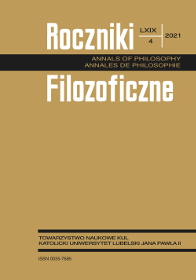Inferencjalizm semantyczny. Studium analityczno-krytyczne filozofii języka Roberta B. Brandoma
Semantic Inferentialism: Analytical and Critical Study of Robert B. Brandom’s Philosophy of Language
Author(s): Robert KublikowskiSubject(s): Philosophy, History of Philosophy, Special Branches of Philosophy, Contemporary Philosophy, Philosophy of Language
Published by: Towarzystwo Naukowe KUL & Katolicki Uniwersytet Lubelski Jana Pawła II
Keywords: meaning; reference; truth; assertion; inference; justification;entitlement;
Summary/Abstract: Robert B. Brandom’s semantic inferentialism is an important and new theory of meaning in the contemporary, analytical philosophy of language. This theory is presented in an extensive way in the monograph entitled Making It Explicit: Reasoning, Representing and Discursive Commitment. The theory is pragmatic, normative, holistic and discursive. On the one hand, Brandom’s standpoint is glorified and on the other hand, it is controversial. This is why a metaphilosophical question arises: How to evaluate the impact of this theory into the philosophy of language? Inferentialism emphasises a material inference, de re ascription and the usage of demonstratives. Such categories are “vertical” and they accent „connection” with reality. Nevertheless, Brandom also emphasises an anaphoric concept of reference and truth. It makes his standpoint valuable because anaphoric understanding of reference and truth delivers an additional explication of the usage of words “refer to” or “is true.” But such categories are “horizontal.” Brandom grasps the problem of acquiring empirical meaning by expressions which initiate anaphoric chains. This is why he proposes — as an attempt of solving the problem — a modification of semantic inferentialism by adding revisionary and fallibilistic epistemology. In addition, Brandom enforces his theory by normative pragmatics which applies categories of assertion, entitlement, various commitments and a “score-keeping.” However, it seems that what is still missing is a notion of truth stronger than the one proposed in the anaphoric conception. What is requested is a notion of truth expressed in terms of the relation of the correspondence between a language and a reality. The disadvantage of the idea of correspondence is that it is difficult to define in a satisfactory way. But an important advantage is that it is “a language-reality” relation and not only “a language-language” relation. The objection does not demolish inferentialism. It expresses only a general epistemological difficulty of defining truth. However, the importance of inferentialism is that it tries to unite various elements. The theory attempts to explicate — in a more adequate way — what a meaning is and to explain how it is acquired by expressions.
Journal: Roczniki Filozoficzne
- Issue Year: 69/2021
- Issue No: 4
- Page Range: 145-169
- Page Count: 25
- Language: Polish

